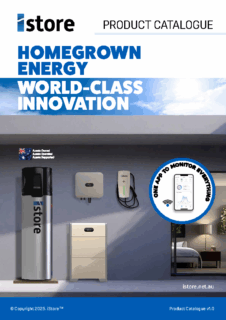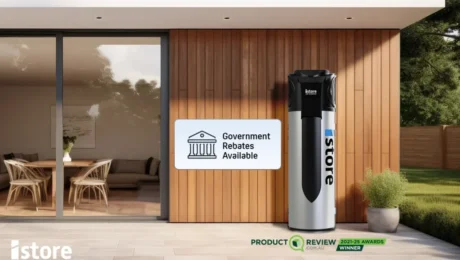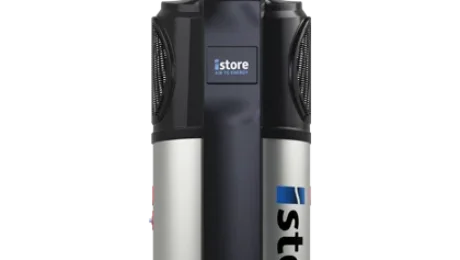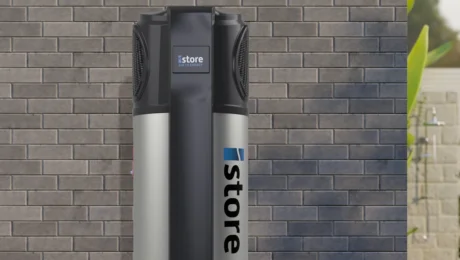Heat Pumps for Homes: Adding Value to New Constructions
Most homeowners focus on aesthetics when designing their homes, and it’s easy to understand why. For years, as they’ve been renting and saving up every spare penny toward their dream home, they’ve imagined how they want it to look.
As a homebuilder or developer, you know there’s more to a home than meets the eye. True value lies in the balance of beauty and function. So, it’s up to you to remind homeowners that functional features are what will make a house really work for them.
Functional features like heat pump hot water systems are an innovative, sustainable choice that will make their new home more comfortable and reduce their energy costs.
With iStore’s high-quality, affordable heat pumps, you’ll deliver not just the beauty your clients want in their homes but also the functionality they need.
Build smarter. Build better. Build with iStore!
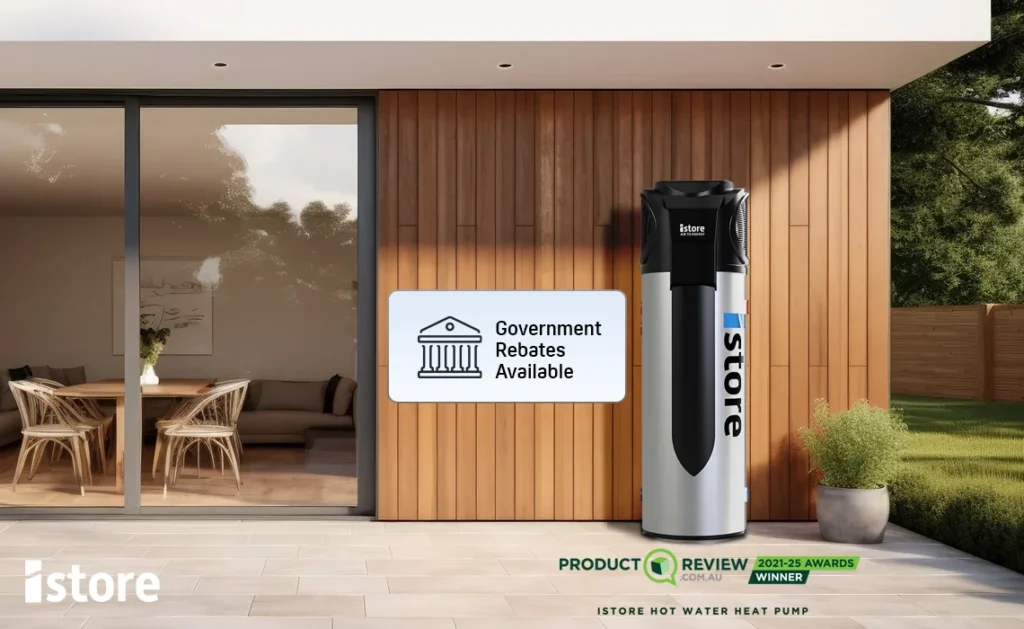
Understanding Heat Pumps for Homes
An air-source heat pump pulls thermal energy (heat) from the air outside and uses it to warm water. Even on a chilly day, the air still contains thermal energy because the molecules in the air are constantly in motion, and this motion is what constitutes thermal energy.
Here’s how it works: The heat pump system draws in air and uses a special liquid (refrigerant) to absorb the air’s heat. The liquid then compresses, making it very hot. That heat transfers to the water stored in the system’s tank, which is now ready for use throughout the home.
What’s amazing is that this process involves simply moving existing heat; it doesn’t rely on generating heat from scratch, like traditional water heaters. Because of this, heat pumps use approximately one-third of the electricity of conventional electric water heaters.
Boost a New Construction’s Value With an iStore Heat Pump
Adding an iStore heat pump hot water system to a new build is a clever selling point because of the following benefits to homeowners.
Energy Efficiency
The performance of a heat pump is typically measured by its Coefficient of Performance (COP), which is the ratio between how much heat the pump produces compared to the electricity it uses. The higher the COP, the more efficient the system.
When the air temperature around an iStore 180L heat pump is 20°C, it can heat water from 15°C to 60°C with a COP of 4.37. This means that for every unit of electricity the system uses, it produces 4.37 times that amount of heat energy to heat water. The 270L heat pump achieves a COP of 4.82 under the same conditions.
This impressive efficiency translates to real energy savings, with iStore heat pumps consuming 75–85% less electricity than traditional electric and gas water heaters!
Long-Term Savings
Although traditional electric or gas water heaters may be cheaper initially, they have much higher running costs over time because they consume significantly more energy to produce the same amount of hot water as a heat pump.
With water heating accounting for up to 27% of the average home’s energy bills, these higher running costs can quickly add up!
While an iStore heat pump may have a slightly higher upfront price tag, it’s a long-term game-changer. Our heat pumps can save households around 70% on heating costs, equating to savings of as much as $1,000 a year on energy bills.
Over time, the savings from lower energy bills will more than cover the heat pump’s initial expense.
Increased Home Value
Homes with sustainable, energy-efficient features like an iStore heat pump often command higher resale prices. The system’s advanced technology and long-term benefits– such as reduced energy bills – make it an attractive selling point for potential buyers.
An iStore heat pump’s compliance with Australian energy efficiency programs and incentives further solidifies its value in the market, reassuring buyers of its quality and reliability.
Superior Performance
iStore electric heat pumps for homes incorporate smart technology for optimal performance.
- Intelligent Computer Control: The built-in computer monitors all aspects of its surroundings and adjusts the heatpumps performance to match the hot water needs while guaranteeing efficiency and reducing energy waste.
- Scheduling Capabilities: Heating schedules can be set to align with daytime excess solar electricity generation or off-peak electricity rates, maximising energy usage and saving homeowners more on electricity.
- User-Friendly Controls: With the easy-to-use digital display, homeowners can conveniently monitor and adjust system settings.
- Diagnostics and Alerts: Built-in diagnostic tools can quickly detect issues and alerts the homeowner to prevent expensive repairs and keep the system running smoothly.
Our heat pumps are also built with high-quality materials and two key features for long-lasting performance.
An integrated heating coil wraps around the outside of the tank, keeping the heating coil separate from the water and avoiding direct exposure to minerals and corrosive elements.
Our tanks also have anodes—metal rods submerged inside the tank preventing rust and damage to the tank itself. Each tank has not one but two anodes—double the anodes means double the durability!
Gentler Environment Impact
A heat pump reduces a home’s greenhouse gas emissions and carbon footprint by using air—a renewable energy source—instead of fossil fuels.
What kind of a reduction are we talking about?
The iStore heat pump uses approximately only 500-800 watts of energy per hour during the heating process, lowering the average Australian home’s CO₂ emissions by up to 2.9 tonnes a year.
For perspective, the average vehicle emits about 4.6 tonnes of CO₂ annually, so reducing CO₂ emissions by 2.9 tonnes is like taking a car off the road for six months!
Choosing the Right Heat Pump for a New Home Construction
Consider the following questions to choose the right heat pump hot water system for your client’s home.
- How big is the household?
A 180L heat pump is sufficient for the daily hot water needs of one to three people, while a 270L size is better suited for the higher demand of four people or more.
- What system setup best suits the home?
For easier installation – and installation in smaller backyards or narrow side passages – an all-in-one outdoor system like the iStore heat pump is the way to go. Its modern, compact design also integrates seamlessly into new homes without compromising aesthetics—it’s a win-win!
- How important are energy efficiency and cost savings to the homeowner?
A heat pump with a high energy efficiency rating will cut down on electricity bills and save them money in the long run.
- What is the climate?
If the house is in a colder area, choose a heat pump proven to perform well in low temperatures.
If you’re building in NSW or Victoria, it’s helpful to know that the Australian Clean Energy Regulator (CER) divides Australia into climate zones, offering these colder regions higher rebates for installing energy-efficient systems.
Additionally, the NSW and Victorian state governments include the iStore heat pump in their ESS and VEU energy-saving programs, proving its reliable performance and efficiency in colder climates.
- How well-insulated is the tank?
Select a tank with good insulation to keep water hot for longer and lessen the heat pump’s workload.
To qualify for a government rebate, a heat pump hot water system must meet the Australian Government’s compliance testing for heat loss. With over 50mm of insulation, the iStore heat pump tank meets and exceeds this testing.
- Will the heat pump be paired with solar panels?
Pairing a heat pump with a solar system reduces electricity costs by using free, renewable solar power to run the pump.
The home’s roof must have enough space for solar panels and get plenty of sunlight to maximise the panels’ use and, in turn, the heat pump.
Installation and Maintenance
iStore heat pumps for homes are quick and straightforward for a professional to install.
- The single-unit design eliminates the need for complex refrigerant piping.
- The compact system requires minimal clearance and fits in typical residential installation spaces.
- Standard 20mm inlet and outlet fittings easily connect to existing plumbing systems.
Pre-configured electrical “3pin 10 amp” plug is a simple plug and play installation.
It is important for homeowners to know that regular maintenance will keep their heat pump performing at its best and extend its lifespan.
Every six months, they should clear away debris around the unit to maintain proper airflow and remove any dust and dirt buildup.
FAQs
What Are the Benefits of Using Heat Pumps in New Constructions?
- Energy Efficiency: Heat pumps use much less electricity than traditional water heaters.
- Savings: Less electricity usage means lower bills. Lower operating costs also offset the upfront investment over time.
- Sustainability: Relying on renewable energy from the air cuts greenhouse gas emissions and supports eco-friendly living.
- Market Appeal: Energy-efficient homes attract buyers and can increase resale value.
- Versatility: Heat pumps work in various climates and can integrate seamlessly into modern designs.
How Do Heat Pumps Compare to Traditional HVAC Systems?
Some might confuse a heat pump with a traditional HVAC system because both use similar technology to transfer heat. However, a heat pump heats water, while a traditional HVAC system is designed for air temperature control.
What Should Builders Consider When Installing Heat Pumps?
- Climate Compatibility: Choose a heat pump designed to perform efficiently in the local climate, especially in colder regions. The iStore heatpump is designed for all climate regions of Australia.
- System Size: Ensure the heat pump’s capacity matches the household’s hot water needs.
- Placement: Plan to install the unit in a well-ventilated area with sufficient clearance to optimise airflow and efficiency.
- Energy Rebates: Check for government incentives or programs that can offset installation costs.
- Professional Installation: Use licensed professionals to guarantee proper electrical and plumbing setup.
How Do Heat Pumps Impact Home Resale Value?
Heat pumps can help homes sell faster and attract higher offers because they lower energy bills and reduce a home’s carbon footprint, meeting the growing demand for more affordable and sustainable living.
Elevate New Constructions With iStore’s Heat Pumps
From showers and luxurious bathtub soaks to washing dishes and doing laundry, hot water is essential to everyday life.
Your clients need reliable, affordable hot water that makes their lives comfortable and doesn’t strain their family’s budget.
Eco-conscious homeowners also want sustainable solutions that reduce their environmental impact without sacrificing style or function.
Partner with iStore today to tick all the boxes for your clients’ hot water needs. Explore our range of the best heat pumps for homes, then call us on 1300 515 640, email info@istore.net.au, or fill out this online form. We look forward to working with you!
- Published in General
Energy-Efficient Heat Pumps: Lower Your Family’s Energy Bills
Tired of your energy bills eating up your budget? With living costs on the rise, looking for ways to cut expenses makes sense. One easy way to save? Upgrading how you heat your water.
An energy-efficient heat pump will be your new best friend. These clever systems use far less electricity than traditional water heaters, giving you hot water when you need it and savings where you want them—your electricity bills.
At iStore, we’re all about helping you heat your home’s water affordably and sustainably because we believe comfort shouldn’t come at a high cost to your family or the environment.
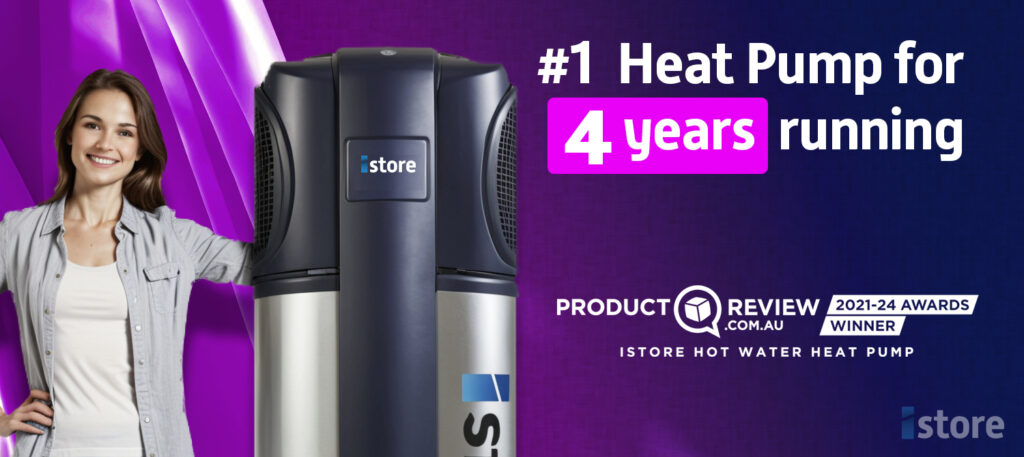
Benefits of Energy-Efficient Heat Pumps
Energy Savings
Energy-efficient electric heat pumps are about three times more efficient than conventional electric water heaters. Instead of constantly burning through electricity, they use smart technology to heat your water, saving you money on electricity bills. These savings really add up over time.
The best energy-efficient heat pumps feature computer control to save you even more money.
Environmental Benefits
Choosing an energy-efficient heat pump isn’t just good for your wallet—it’s great for the planet, too.
A heat pump uses less electricity than an electric water heater because it transfers thermal energy from the air rather than generating heat directly. As this process relies on air—a renewable energy source—instead of fossil fuels, your home’s greenhouse gas emissions and carbon footprint are reduced.
How iStore Can Help
Energy Efficiency
What energy-efficient features can you enjoy from iStore’s 180L and 270L heat pump models?
- Savings: Cut your water heating costs by up to 70% and save as much as $1,000 a year on your energy bills.
- Lower Electricity Usage: Consuming 75–85% less electricity than traditional electric and gas water heaters.
- Reduced Carbon Footprint: Using approximately only 500-800 watts of energy per hour during the air-to-energy heating process, lowering the average Australian home’s CO2 emissions by up to 2.9 tonnes a year.
Optimal Performance
Both models incorporate innovative technology for optimal performance.
- Intelligent Operating Modes: Built-in computer control makes sure that your iStore is always operating at the most efficient regardless of weather or usage.
- User-Friendly Controls: An accessible digital interface makes monitoring and adjusting settings easy, reducing the need for costly service calls for simple adjustments.
- Scheduling Capabilities: You can program heating cycles to align with off-peak electricity rates, maximising energy usage and cost savings.
- Diagnostics and Alerts: Built-in diagnostic tools can detect issues and display error codes, identifying problems early to reduce system downtime.
Quick Installation
The iStore’s heating components and storage tank are combined into a single unit, making professional installation quick and easy. Installation typically takes 2–3 hours, and your hot water should be up and running that evening.
What Our Clients Have To Say
Here’s what just a handful of customers have to say about their iStore heat pump.
“Great, affordable unit. Had a 180L iStore heat unit installed to replace our old instant gas unit. Easy-to-use unit with good energy-saving features. Heats water and holds heat efficiently.”
Samuel B.
“We had the iStore 180L heat pump installed a couple of months ago and are more than happy with its performance. For a two-person household, this hot water service has consistently delivered hot water. Given that we have solar, we run the heat pump during the day, with the water set to heat between 10 am and 3 pm, so the cost is minimal.”
Pia Jess, Adelaide, SA
“Amazing product. The iStore unit is very energy-efficient and works perfectly. Customer support after purchase was very prompt. Highly recommend if you need to replace a hot water unit. Quiet and efficient.”
Will
“Very efficient unit! The controls are great, allowing me to time the running time to solar hours so that I get free hot water. I’ve got a household of four (no teenagers yet!) but have never run out of hot water with the 180L.”
Jaytee, ACT
“Didn’t know what hot water was till I got an iStore! I recently purchased the iStore after reading all the fantastic reviews online, and I’m so glad I did! The product is amazing, and I didn’t realise how bad my previous hot water system was till I bought the iStore. The installation and ordering were super quick and easy. I will be recommending this product to all my friends and family.”
Taylah, Perth, WA
How Air-Source Heat Pumps Work
Air-source heat pumps pull heat from the air to heat water. Unlike conventional water heaters, which use electricity to generate heat, energy-efficient electric heat pumps use electricity to move heat from one place to another. This process requires much less electricity.
Here’s a simple breakdown:
- The system draws in warm air using a fan.
- The air passes over a coil filled with a special fluid called refrigerant.
- The refrigerant absorbs the heat from the air and turns into a gas.
- A compressor pumps the gas, making it hotter.
- This hot gas transfers its heat to the water in the storage tank.
- The refrigerant cools down, returns to liquid form, and the cycle starts again.
Choosing the Right Heat Pump for Your Home
How big is your household?
A 180L heat pump is sufficient for the daily hot water needs of one to three people: showers, dishwashing, and light laundry. A 270L size is better suited for the higher demand of four people or more: multiple showers, large bathtubs, and frequent loads of laundry and dishes.
How important are energy efficiency and cost savings to you?
Look for a heat pump with a high energy-efficiency rating to cut down on electricity bills and save you money in the long run.
What’s the climate like where you live?
If you live in a colder area, choose a heat pump specifically designed to perform well in low temperatures. The iStore is designed to perform in all climate situations experienced in Australia.
How well-insulated is the tank?
Choose a tank with good insulation to keep water hot for longer and reduce the heat pump’s workload. The istore meets and exceeds the Australian insulation testing standards.
Will you pair your heat pump with solar panels?
Check that your roof has enough space and gets plenty of sunlight to make the most out of your solar panels and, in turn, your energy-efficient heat pump.
Rebates and Incentives
State-Based Savings
Some Australian state governments offer incentives and rebates if you install solar panels, solar batteries, and heat pumps.
You may be eligible for $800 to $3,000 off a renewable energy hot water system when replacing a traditional system. You could receive a $700 rebate just for installing an iStore 180L or 270L heat pump, as it’s approved by the Australian Federal Government Clean Energy Regulator.
In NSW, incentives are available off the upfront installation cost of a household solar battery for homes with existing solar systems. The excess solar energy stored in this battery can power your heat pump.
In Victoria, eligible households can receive rebates for installing solar panels. Using solar panels to power your heat pump will reduce your reliance on the grid and your water heating costs.
Federal Incentives
The Federal Small-Scale Renewable Energy Scheme (SRES) is an Australian government initiative encouraging households and small businesses to install renewable energy systems, such as solar panels, solar hot water systems, and heat pumps.
Under this scheme, when you install an eligible system, you receive Small-Scale Technology Certificates (STCs), which can be sold to lower the upfront cost of your system. The number of certificates you receive depends on your system’s size, location, and the amount of renewable energy it’s expected to generate or displace over its lifetime.
Electricity tariffs are also available Australia-wide to save households money on their bills, but the types and structures of tariffs vary depending on the state, territory, and energy provider.
One such tariff is the time-of-use tariff. Electricity rates vary depending on the time of day, with lower rates during off-peak hours. You can reduce energy expenses by scheduling your heat pump to operate during these cheaper periods as well as daytime excess power generation.
FAQs
What Government Incentives Are Available for Installing Heat Pumps?
Under the Federal Small-Scale Renewable Energy Scheme (SRES), households installing eligible renewable energy hot water systems can create Small-Scale Technology Certificates (STCs). These STCs can then be sold to recover a portion of the upfront system installation cost.
On a state level, homes may be eligible for rebates for a renewable energy hot water system when replacing a traditional one.
How Do Energy-Efficient Heat Pumps Impact Home Resale Value?
Energy-efficient heat pumps can increase home resale value by appealing to buyers looking for lower energy bills, modern technology, and sustainable features.
How Do I Choose the Right Size Heat Pump for My Home?
A 180–200L system suits smaller households of one to three people, while larger families of four or more likely need a 270–300L system.
Start Saving with iStore’s Energy-Efficient Heat Pumps
Want to enjoy hot water without being left steaming over your energy bills?
It’s time to install an iStore energy-efficient heat pump! By using renewable thermal energy from the air to heat your water, you’ll cut costs—not comfort—and keep the environment happy!
Explore our range of the best energy-efficient heat pumps in Australia, then contact us today to upgrade your home’s water heating system. Call 1300 515 640 or fill out this online form, and we’ll be in touch soon.
- Published in General
Choosing the Best Heat Pump Heater: A Guide for Plumbing Professionals
When you’re on the job, every choice matters. The right tools, the right materials, and—most importantly—the right products for your customers.
Heat pump heaters aren’t just another product; they’re key to delivering reliable, energy-efficient hot water to every home and business you work on. Choosing the best heat pump heater means happier customers and a reputation for excellent work.
At iStore, we provide top-quality heat pump heaters at competitive prices to keep your projects profitable.
What Is a Heat Pump System?
Unlike traditional electric heaters, which use electricity to generate heat, or gas heaters, which burn fuel, heat pump water heater systems draw thermal energy from the air to heat water.
Since air is a limitless resource, using it to heat water is a smart, sustainable choice that reduces energy use and costs.
How Does a Heat Pump Heater Work?
- A fan pulls in air across the heat pump’s evaporator.
- Refrigerant in the evaporator absorbs thermal energy from the air. This energy causes the refrigerant to heat up and change from a liquid to a gas.
- The compressor then pressurises this gas, making it hot.
- The hot gas travels through a condenser coil, which heats the water inside a coil-wrapped tank.
- Once the gas cools down, it turns into a liquid and returns to the evaporator to start the process again.
- The cycle continues until the set target temperature is achieved.
- As customers use hot water in their homes, the cycle restarts once the tank temperature drops below a certain temperature.
Exploring iStore’s Product Range
The iStore 180L heat pump is ideal for smaller households with up to three people, efficiently handling daily showers, regular dishwashing, and small laundry loads.
The 270L heat pump is better suited for larger households of four or more people, managing multiple back-to-back showers, filling large bathtubs, and frequent dishwashing and laundry loads.
Both models incorporate innovative technology for optimal performance your customers will love.
- Intelligent Computer Control: The built-in computer monitors all aspects of its surroundings and adjusts the pump’s performance to match the hot water needs while guaranteeing efficiency and reducing energy waste.
- Scheduling Capabilities: Users can program heating cycles to align with off-peak electricity rates, maximising energy usage and cost savings.
- User-Friendly Controls: Accessible digital interfaces enable users to monitor and adjust settings easily, which can reduce the need for service calls for simple adjustments.
- Energy Efficiency: With a high COP (Coefficient of Performance), our heat pumps produce more heat than conventional systems for the same amount of electricity.
- Diagnostics and Alerts: Built-in diagnostic tools can detect issues and display error codes, facilitating faster and more accurate troubleshooting.
And for you, iStore heat pump water heaters are easy to install! We’ll explore this later.
Choosing the Right Heat Pump
Household Size and Hot Water Usage
Here are key factors to consider when recommending a heat pump heater to your customers.
- Smaller Households (1–3 people): For homes where daily use includes a couple of showers, washing dishes, and light laundry, a 180L heat pump is a great choice. It meets typical demands without overspending on capacity.
- Larger Households (4+ people): If your customer’s family takes back-to-back showers, fills larger bathtubs, or runs frequent loads of laundry and dishes, go for a 270L model. It can keep up with heavier hot water needs, so no one has to face the dreaded cold last shower of the day.
- Future-Proofing: Is your customer’s household small now but could potentially grow later? A bigger system can save them from needing a future upgrade.
Climate Compatibility
It’s important to take into consideration where your customer lives because although heat pump water heaters are suitable for various climates, their efficiency can change depending on the temperature.
Standard heat pumps work well year-round in mild to warm climates with temperatures consistently above 0°C. They pull enough heat from the air to meet daily hot water demands without extra assistance.
In areas where temperatures regularly drop below 5°C, you’ll want a heat pump with these features.
- Defrost Function: Prevents ice build-up on the evaporator, ensuring the system runs smoothly even in freezing conditions.
- Boost Mode or Backup Element: A supplementary heating element helps maintain water temperature when the air is too cold for the heat pump to operate effectively.
- Insulated Tank: Better insulation keeps the water hot for longer, reducing the system’s workload.
Installation Made Easy
Simple Setup Process
iStore heat pump heaters are designed for straightforward installation.
- Integrated Design: The heat pump (evaporator, fan, and compressor) and storage tank are combined into a single unit, eliminating the need for complex refrigerant piping and reducing installation time.
- Standard Connections: Equipped with standard ¾ inch inlet and outlet fittings for quick and secure connections.
- Pre-Wired Electricals: Equipped with a standard 3-pin 10 amp plug is a simple plug and play installation.
- Compact Footprint: Fits in typical installation spaces, needing minimal clearance. Suitable for various residential settings without extensive modifications.
- User-Friendly Commissioning: The intuitive control panel facilitates easy programming of operating modes and temperature settings.
Minimal Downtime
The iStore heat pump heater’s quick and easy installation means your customers won’t have to endure long periods without hot water, keeping their daily routines intact.
The fast installation also reflects your service well, keeping your customers happy and making them more likely to trust you with future jobs.
Comprehensive Guides and Support
We provide comprehensive resources to support you throughout the installation process of our heat pump water heater systems.
Detailed installation manuals for the 180L and 270L models are accessible on our website. These manuals cover every aspect of the installation process, including site selection, plumbing connections, electrical requirements, and system commissioning.
Got an installation question or after some technical advice? Our support team is ready to help. Call us on 1300 515 640, email info@istore.net.au, or fill out this online form.
Additionally, our website has a FAQ section that addresses common installation questions.
Plumbing Considerations
Sacrificial Anode
After installing an iStore heat pump, it’s a good idea to explain the system’s sacrificial anode to your customer. You can tell them how this metal component in the system’s water tank attracts corrosive elements in the water, preventing them from attacking and corroding the tank.
Each iStore heat pump heater has two sacrificial anodes: the whole life anode, which stays in place for the system’s entire lifespan, and the service anode, which must be replaced.
If the customer’s home uses capital city water, you should check and if required replace the service anode every two years. More frequent checks and replacements are necessary for harsher regional water usage.
Scaling Protection
Your customers must understand that minerals found in hard water, such as calcium and magnesium, can build up inside their systems, forming scale deposits on heating elements and internal components.
Scaling can make it harder for the heat pump to transfer heat to the water, increasing energy use and running costs. Excessive scale can lead to clogged pipes, damaged components, and even system failure, resulting in costly repairs or replacements.
Educating your customers on scaling protection measures, like installing a water softener in hard water areas or scheduling regular maintenance, will save them money on energy and repairs and extend the life of their heat pump water heater.
FAQs
What Should Plumbing Professionals Look for in a Heat Pump Heater?
Look for a heat pump heater that
- Can accommodate the number of occupants in the home and their hot water demands.
- Has a high COP (Coefficient of Performance) for efficiency.
- Features defrost modes or backup heating for colder climates.
- Is durable, with a sacrificial anode for corrosion protection.
- Offers clear installation manuals, accessible support, and easy maintenance.
What Are the Installation Requirements for Heat Pump Heaters?
Heat pump heaters must be installed in well-ventilated areas with access to ambient air, like outdoors or in a ventilated space. They require standard plumbing connections, a suitable electrical supply, and enough clearance for airflow and maintenance.
How Can Heat Pump Heaters Benefit My Clients?
Heat pump heaters provide more energy-efficient hot water than traditional systems, reducing electricity costs. Because they use less energy, they cut carbon emissions and are environmentally friendly. All while providing your customers with reliable hot water!
What Maintenance Is Needed for Optimal Performance?
- Every Six Months: Inspect the heat pump water heater system for leaks and clean debris from the air intake vents, filters, and the unit’s surrounding area.
- Every 2–3 Years: System servicing by a licensed plumber checking and if required replace the sacrificial service anode.
Elevate Your Services with iStore’s Heat Pump Heaters
Your customers will love the reliable, eco-friendly iStore heat pump heater, which never disappoints in delivering hot water and slashing electricity bills.
And you’ll love using iStore’s products because they’re easy to install and maintain and come with extensive installation support.
Explore our heat pump heaters online, then contact us today to find an iStore supplier near you. Call 1300 515 640 or fill out this online form, and we’ll be in touch soon.
- Published in General
Discover the Benefits of Heat Pump Hot Water Systems
Say goodbye to the days of draining your wallet and your patience waiting for hot water. Discover revolutionary heat pump hot water systems, the cost-effective and eco-friendly solution for heating your home’s water.
At iStore, our heat pumps are built for sustainability, affordability, and performance to make your home greener, your energy bills leaner, and your hot showers longer.
What is a Heat Pump Water Heater?
Unlike traditional electric heaters that simply convert electricity into heat, and gas heaters that burn fuel to generate heat, heat pump hot water systems extract heat from the air.
Air is an unlimited natural resource, so using it to heat water is sustainable and just makes sense!
How Does a Heat Pump Hot Water System Work?
A fan pulls air over a hot water heat pump’s evaporator, where refrigerant absorbs heat from the air and turns the refrigerant into a gas. The compressor pressurises this gas, heating it further. The hot gas then passes through a condenser coil, heating the water inside the tank. As the gas cools, it returns to a liquid and cycles back to the evaporator.
This process continues until the water reaches the set temperature and restarts when the water drops below the set temperature, as hot water is used.
Heat pump hot water systems can be paired with solar panels. The solar panels generate the electricity needed to power the heat pump, reducing reliance on the grid, lowering electricity costs, and making the system even more environmentally friendly.
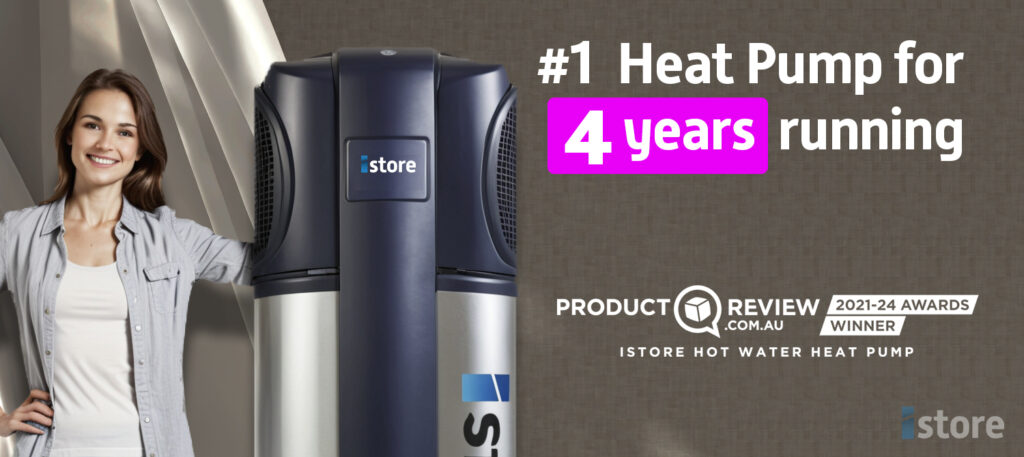
Benefits of iStore’s Heat Pump Hot Water Systems
Sustainability
Our hot water heat pumps consume 75–85% less electricity than traditional electric and gas water heaters.
By relying on renewable thermal energy rather than fossil fuels, an iStore heat pump helps reduce your carbon footprint. It consumes approximately only 500 watts of energy per hour during the air-to-energy heating process and can lower the average Australian home’s CO2 emissions by up to 2.9 tonnes a year!
For further sustainability, you can integrate an iStore heat pump with an iStore hybrid solar inverter and battery. Excess photovoltaic (PV) energy generated by your solar panels can run your heat pump instead of going to waste.
Savings
Because our heat pumps use much less electricity than traditional water heaters, you’ll notice significant savings on energy bills.
How significant?
Your water heating costs can be lowered by up to 70%, saving you up to $1000 a year!
iStore hot water heat pumps feature four economical operating modes to save you even more money. There’s a hybrid mode for when guests are staying at your place and a vacation mode for when you’re away.
Additionally, this innovative, money-saving water heating solution can appeal to potential buyers, enhancing your home’s value.
Versatility, Reliability, and Easy Maintenance
iStore heat pumps supply hot water to kitchens, laundries, and multiple bathrooms in homes of all sizes.
These pumps automatically restart the heating cycle once the temperature in the tank has dropped below a set temperature, so you’ll always have hot water on hand.
The all-in-one pump unit is quick and easy to install, and maintenance is minimal because there are few moving parts.
iStore’s Heat Pump Solutions
iStore heat pump hot water systems are available in two sizes, both boasting all the amazing benefits mentioned above.
The 180L pump is perfect for smaller homes with water heating needs that may include up to three people showering daily, washing dishes, and doing small laundry loads.
The 270L pump is better suited for larger households with more hot water needs, such as multiple family members (four or more) taking back-to-back showers, filling large bathtubs, and handling lots of dishwashing and laundry loads.
Choosing the Right Heat Pump Hot Water System
Picking the right hot water heat pump doesn’t have to be tricky. Here are some quick tips to help you make the best choice.
- Household Size: More people means more frequent hot water usage. A 180–200L system suits smaller households, while larger families might need a 270L system or bigger.
- System Type: Got space outdoors? A split system gives you flexibility because the heat pump sits outside, and the tank can go wherever it fits best. Prefer an all-in-one option? An integrated system combines everything in one unit, making installation easier.
- Climate: Heat pumps work well in most climates, but if you live somewhere colder, choose one designed for low temperatures.
- Insulation: Look for a tank with good insulation so your water stays hot for longer and your heat pump doesn’t have to work as hard.
- Roof Space and Shading: If you plan to pair your heat pump with solar panels, make sure your roof has enough space for the panels and gets plenty of sunlight for the best results.
Types of Heat Pump Hot Water Systems
The main types of heat pump hot water systems are split and integrated.
In a split system, the evaporator, fan, and compressor that operate the pump are separate from the water storage tank and connected by refrigerant piping. The heat pump is installed outside, while the tank can be installed indoors or outdoors, offering more installation flexibility and quieter operation, as the compressor is outside.
An integrated system combines the heat pump and water storage tank into a single unit, with the pump mounted on top of the storage cylinder. This setup is ideal for spaces needing a streamlined solution, such as smaller backyards or narrow side passages, because it’s more compact and easier to install.
Speaking of installation, heat pump hot water systems are typically installed by a licensed plumber on a flat, stable surface, such as a concrete slab or paved area. Once everything is connected to the water and power supply, you’re ready to enjoy hot water.
Worried about where to install your hot water heat pump? It will still operate well in shaded or low-light areas because it extracts heat from the surrounding air, not direct sunlight.
Costs and Incentives
Heat pump hot water systems can be more expensive upfront than traditional electric or gas systems, but they make up for it by saving you money on power bills.
With an iStore heat pump’s high-quality construction and long-lasting performance, you’re investing in a system that delivers reliable savings for years to come. And with our competitive pricing, you get excellent value without compromising on efficiency or durability.
Government incentives, rebates, and electricity tariffs are available to help further offset the cost of installation.
- Federal Small-Scale Renewable Energy Scheme (SRES): Households installing eligible renewable energy hot water systems can create Small-Scale Technology Certificates (STCs) that are then sold to recover a portion of the upfront system installation cost.
- State Incentives: Some state governments offer incentives for the installation of solar panels, batteries, and heat pumps.
- NSW: For homes with existing solar systems, incentives range from $1,600 to $2,400 off the upfront installation cost of a household solar battery. The excess solar energy stored in this battery can power your heat pump.
- Victoria: Eligible households can receive a rebate of up to $1,400 for installing solar panels. Using solar panels to power a heat pump will reduce your grid reliance and water heating costs.
- Renewable Energy Hot Water System Rebates: Depending on the state you live in, you may be eligible for $800 to $3,000 off a renewable energy hot water system when replacing a traditional one. You could receive a $1,080 incentive for installing an iStore 270L heat pump, as it’s approved by the Australian Federal Government Clean Energy Regulator.
Time-of-Use Tariffs: Electricity rates vary depending on the time of day, with lower rates during off-peak hours. By scheduling your hot water system to operate during these cheaper periods, you can further reduce energy expenses.
FAQs
What Are the Main Advantages Over Traditional Water Heaters?
Heat pumps
- Use up to 85% less electricity than traditional electric and gas water heaters.
- Reduce your power costs over time.
- Can be paired with solar panels for even greater savings.
- Lower your carbon footprint by using renewable heat from the air.
How Much Can I Save on My Energy Bills?
With an iStore heat pump, your water heating costs can be lowered by up to 70%, saving you up to $1000 a year compared to conventional hot water systems.
What Maintenance Is Required for Heat Pump Systems?
A heat pump hot water system should be inspected for leaks and freed of debris every six months, and air filters should be washed or replaced every 6–12 months.
It’s recommended that a licensed plumber service the system every 2–3 years.
Discover the Future of Hot Water Heating Today!
iStore heat pumps work smarter, not harder—tapping into clever tech to shrink your carbon footprint and cut your energy bills down to size while your family enjoys hot water on demand.
Explore our hot water heat pump range online, then contact us today to upgrade your home’s water heating system. Call 1300 515 640 or fill out this online form, and we’ll be in touch soon.
- Published in General

